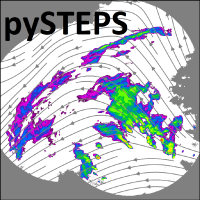pysteps.noise.fftgenerators.initialize_nonparam_2d_nested_filter#
- pysteps.noise.fftgenerators.initialize_nonparam_2d_nested_filter(field, gridres=1.0, **kwargs)#
Function to compute the local Fourier filters using a nested approach.
- Parameters:
field (array-like) – Two- or three-dimensional array containing one or more input fields. All values are required to be finite. If more than one field are passed, the average fourier filter is returned. It assumes that fields are stacked by the first axis: [nr_fields, y, x].
gridres (float) – Grid resolution in km.
max_level (int) – Localization parameter. 0: global noise, >0: increasing degree of localization (default 3).
win_fun ({'hann', 'tukey', None}) – Optional tapering function to be applied to the input field, generated with
pysteps.utils.tapering.compute_window_function()(default ‘tukey’).war_thr (float [0;1]) – Threshold for the minimum fraction of rain needed for computing the FFT (default 0.1).
rm_rdisc (bool) – Whether or not to remove the rain/no-rain disconituity. It assumes no-rain pixels are assigned with lowest value.
fft_method (str or tuple) – A string or a (function,kwargs) tuple defining the FFT method to use (see “FFT methods” in
pysteps.utils.interface.get_method()). Defaults to “numpy”.
- Returns:
field – Four-dimensional array containing the 2d fourier filters distributed over a 2d spatial grid. It can be passed to
pysteps.noise.fftgenerators.generate_noise_2d_ssft_filter().- Return type:
array-like
